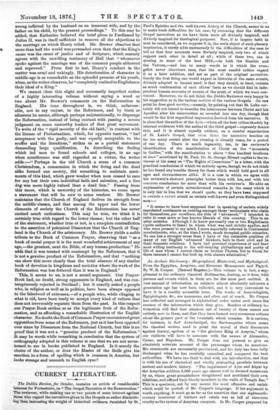CURRENT LITERATURE.
The Dublin Review, for October, contains an article of considerable interest for Protestants, on " The Gospel Narrative of the Resurrection." The reviewer, while making one or two points of some interest against those who regard the narratives given in the Gospels as rather diminish- ing than increasing the weight of historical evidence furnished by St. Paul's Epistles and the well-known history of the Church, seems to us to make fresh difficulties for his case, by assuming that the different Gospel narratives as we have them wore all divinely inspired, and divinely inspired for theological purposes. Now, if to inspire faith in man be considered, as we suppose it is, the main object of such plenary inspiration, it surely adds enormously to the difficulties of the case to tell AB that four accounts were divinely inspired, only two of which support each other in detail at all ; while of these two, one is missing in some of the best MSS.,—in both the Sinaitic and the Vatican,—and has so many words in it which the evan- gelist never elsewhere uses, that the most candid critics regard it as a later addition, and not as part of the original narrative. Surely the first thing one would expect in histories of the same events, divinely adapted to human need, is that they should, at least, contain as much confirmation of each others' facts as we should find in inde- pendent human accounts of events of the truth of which we were con- vinced. Moreover, we do not think the Dublin Reviewer very happy in his suggestion as to the various motives of the various Gospels. On one point he does good service,—namely, by pointing out that St. Luke cer- tainly did not intend to describe the intercourse between Christ and his Apostles after his resurrection as crowded into one day, though that would be the first superficial impression derived from his narrative. It is clear that the author of the Acts—whom all the best critics identify by internal evidences With the author of the third goepel—expressly denies this, and it is almost equally evident, on a careful examination of St. Luke's Gospel, that even there the narrative touches on far too many events after the evening is already come, for a period of one day. There is much ingenuity, too, in the reviewer's identification of the manifestation of Christ on the "mountain in Galilee," with the manifestation to above "five hundred brethren at once" mentioned by St. Paul. Dr. St. George 3iivart replies to the re- viewer of his essay on "The Rights of Conscience" in a letter, with the practical conclusions of which we entirely agree, though we do not think he has found any tenable theory for them which would hold good in all ages and circumstances alike. It is a case in which we agree with his reviewer's abstract principles better than with his, and with his concrete conclusions far more than with his reviewer's. He adds an explanation of certain misunderstood remarks. in the essay which it is only fair to him that we should quote, as they have been supposed to contain a covert attack on certain well-known and even distinguished men:— "it seems to have been supposed that in speaking of certain widely reprobated sentiments as existing amongst those 'enthusiasts who claim for themselves, par excellence, the title of " advanced," ' I intended to refer to some more or less known liberals of this country. This in an titter mistake. Although I do know personally one or two Englishmen (quite unknown to fame) to whom what was said strictly applies, and who were present to my mind, I more especially referred to Continental revolutionists, who, at the time I wrote, much occupiedpublie attention. No one has a stronger sense than I have of the estimable qualities of many of our English 'advanced' thinkers, both in their civil and in their domestic relations. I have had personal experience of and bear most willing testimony to the self-denying philanthropy and purity of life of men whom I cannot claim as brother Theists, but to whom for these reasons I cannot but look up with sincere admiration."






































 Previous page
Previous page